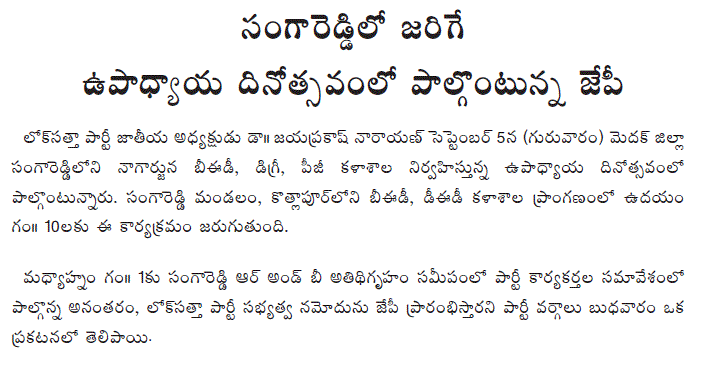Press Releases Archive
Lok Satta realizes its dream of a Judicial Commission: Dr.JP
The Lok Satta Party today welcomed the Rajya Sabha passing the Constitution (120th Amendment) Bill, 2013 providing for creation a Judicial Appointments Commission (JAC).
It may be recalled that the Lok Satta had brought together three eminent judges of unimpeachable integrity and credibility to come up with proposals for judicial appointments and an Indian Judicial Service. The three judges – Chief Justice M. N. Venkatachalaiah, Chief Justice J. S. Verma and Justice V. R. Krishna Iyer – produced a report recommending formation of a National Judicial Commission for appointment of judges in higher courts and an Indian Judicial Service for competitive, nation-wide recruitment of judges at the district judge level.
The Lok Satta Party shared the report with all major political parties and parliamentarians and briefed Government and Opposition leaders on its salient features.
The Bill adopted by the Rajya Sabha on September 5 is a modified version of the proposals made by the three eminent judges, pointed out Lok Satta Party national President Dr. Jayaprakash Narayan here today.
In a media statement, Dr. JP said that the Bill associates the executive, legislature and judiciary in the appointment of higher judges. Combined with the Judicial Standards and Accountability law, the Bill ensures both quality and accountability in the higher judiciary. If the Indian Judicial Service also becomes a reality, it will provide a large pool of highly qualified judges in the subordinate judiciary for appointment to higher courts.
Dr. JP recalled that the Supreme Court usurped the power to appoint judges of higher courts for nearly two decades by introducing the collegiums system.
Dr. JP said: “This usurpation is plainly unconstitutional, and violates the principle of checks and balance in relation to organs of the State. In no other democracy judges are the sole appointing authority of judges. Even in practice, appointment of judges by the Supreme Court collegium has been found to be unsatisfactory and undermining the quality and credibility of the judiciary“.
Dr. JP pointed out that the Indian judiciary plays a seminal rule in safeguarding citizens’ liberty, promoting rule of law and above all in reconciling and harmonizing conflicting points of view in a highly diverse and polarized society like India. Therefore, the courts’ credibility and quality of individual judges are critical.
The proposed Judicial Appointments Commission will comprise the Chief Justice of the Supreme Court, two Supreme Court judges, Law Minister and Law Secretary and two eminent jurists. The jurists will be chosen by a committee comprising the Prime Minister, leader of the Opposition and Chief Justice of India.
Dr. JP appealed to all political parties, jurists and members of the bar to support the proposal for constitution of the Indian Judicial Service also.
Hats off to SC for upholding rule of law: Dr. JP
The Supreme Court has demonstrated its judicial wisdom and commitment to constitutionalism and rule of law in its two verdicts concerning the polity, said Lok Satta Party national President Dr. Jayaprakash Narayan in a media statement here today.
Dr. JP was referring to the Supreme Court’s recent order about the persons to be appointed to central and state information commissions and its refusal to exempt convicted legislators from disqualification.
Dr. JP pointed out that in the last 25 years, the Supreme Court has emerged as the nation’s most trusted institution. Through its two latest verdicts, the apex court has established the majesty of the higher judiciary and earned the esteem of the public.
At the same time, Dr. JP said, the Supreme Court is not infallible. During the Emergency, the Supreme Court failed to protect people’s lives in the habeas corpus case. The apex court usurped the power to appoint judges against all canons of constitutionalism and democratic governance. In a self-serving order earlier, the Court ruled that only Judges and Jurists could be appointed as members of autonomous bodies and quasi-judicial authorities. It delivered a bizarre verdict in holding NEET as unconstitutional. It has done immense harm to the economy by imposing blanket bans on mining.
The Court now wisely reversed its ruling on appointments to Information Commissions, and corrected its error. Similarly, the Court’s Order quashing Sec 8(4) of the RP Act, and holding that legislators convicted of a crime are disqualified from contesting is a sound an unassailable verdict. By rejecting government’s plea to review its judgment, the Court acted with wisdom and fairness.
Dr. JP said that the Supreme Court should focus on being the guardian of the Constitution and refrain from encroaching on executive authority or indulging in judicial overreach. It is restraint and wisdom that gives the Supreme Court greater credibility. The Supreme Court, he said, has displayed great humility and willingness to correct past mistakes by reversing its earlier order on appointments to information commissions.
Dr. JP said that checks and balances are the hallmarks of a well functioning democracy. The legislature, executive and judiciary should all work with clarity, humility and balance to protect liberty and promote prosperity.




